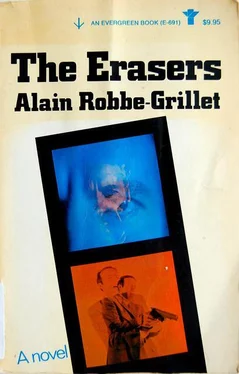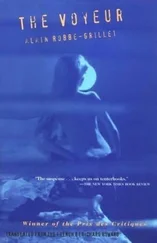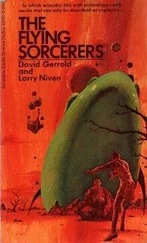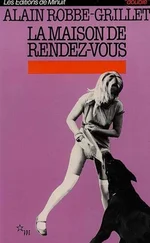Alain Robbe-Grillet - The Erasers
Здесь есть возможность читать онлайн «Alain Robbe-Grillet - The Erasers» весь текст электронной книги совершенно бесплатно (целиком полную версию без сокращений). В некоторых случаях можно слушать аудио, скачать через торрент в формате fb2 и присутствует краткое содержание. Жанр: Криминальный детектив, на английском языке. Описание произведения, (предисловие) а так же отзывы посетителей доступны на портале библиотеки ЛибКат.
- Название:The Erasers
- Автор:
- Жанр:
- Год:неизвестен
- ISBN:нет данных
- Рейтинг книги:4 / 5. Голосов: 1
-
Избранное:Добавить в избранное
- Отзывы:
-
Ваша оценка:
- 80
- 1
- 2
- 3
- 4
- 5
The Erasers: краткое содержание, описание и аннотация
Предлагаем к чтению аннотацию, описание, краткое содержание или предисловие (зависит от того, что написал сам автор книги «The Erasers»). Если вы не нашли необходимую информацию о книге — напишите в комментариях, мы постараемся отыскать её.
The Erasers — читать онлайн бесплатно полную книгу (весь текст) целиком
Ниже представлен текст книги, разбитый по страницам. Система сохранения места последней прочитанной страницы, позволяет с удобством читать онлайн бесплатно книгу «The Erasers», без необходимости каждый раз заново искать на чём Вы остановились. Поставьте закладку, и сможете в любой момент перейти на страницу, на которой закончили чтение.
Интервал:
Закладка:
The two adversaries move away toward the bar, seeking new partisans. Wallas turns his back on the drunk, who goes on nevertheless, his voice jubilant and deliberate:
“What animal is parricide in the morning, incestuous at noon, and blind at night?”
At the bar the discussion has become a general one, but the five men are all talking at once and Wallas can hear only snatches of their remarks.
“Well,” the drunk insists, “can’t you guess? It’s not so hard: parricide in the morning, blind at noon…No…blind in the morning, incestuous at noon, parricide at night. Well? What animal is it?”
Fortunately the manager comes over to take away the empty glasses.
“I’ll be keeping the room tonight,” Wallas informs him.
“And he’ll pay the next round,” the drunk adds.
But no one pays any attention to this suggestion.
“Well, are you deaf?” the drunk asks. “Hey! Buddy! Deaf at noon and blind at night?”
“Let him alone,” the manager says.
“And limps in the morning,” the drunk concludes with sudden seriousness.
“I told you to let him alone.”
“All right, I wasn’t doing anything. I’m asking a riddle.”
The manager wipes his rag across the table.
“Let us alone with your riddles.”
Wallas leaves. More than any specific task to be accomplished, it is the man with the riddles who is chasing him out of the little cafe.
He prefers to walk, despite the cold and the night, despite his fatigue. He tries to organize the various elements he has been able to pick up here and there during the course of the day. Passing in front of the garden fence, he glances up at the house, now empty. On the other side of the street, Madame Bax’s window is lit.
“Hey! Aren’t you waiting for me? Hey! Buddy!”
It is the drunk who is pursuing him.
“Hey! You there. Hey!”
Wallas walks faster.
“Wait a minute! Hey!”
The jubilant voice gradually fades.
“Hey there, don’t be in such a hurry… Hey!… Not so fast…Hey! Hey!…Hey!…”
2
Eight short fat fingers pass delicately back and forth over each other, the back of the four right fingers against the inside of the four left fingers.
The left thumb caresses the right thumbnail, gently at first, then pressing harder and harder. The other fingers exchange positions, the back of the four left fingers vigorously rubbing the inside of the four right fingers. They interlace, lock, twist each other; the movement grows faster, more complicated, gradually loses its regularity, soon becomes so confused that nothing more can be distinguished in the swarm of joints and palms.
“Come in,” Laurent says.
He rests his hands flat on the desk, fingers spread wide. It is an officer with a letter.
“Someone slipped this under the door of the concierge’s lodge. It’s marked ‘Urgent’ and ‘Personal.’ ”
Laurent takes the yellow envelope the man hands him. The address, written in pencil, is scarcely legible: “Personal. Chief Commissioner. Urgent.”
“The concierge didn’t see who brought this letter?”
“He couldn’t; he found it under his door. It may have already been there a quarter of a hour, or even more.”
“All right. Thanks.”
When the officer has left the room, Laurent feels the envelope. It seems to contain a rather stiff card. He holds it up to the electric light, but sees nothing abnormal about it. He decides to open it with his paper knife.
It is a picture post card showing a little house in a bad imitation Louis XIII style, at the corner of a long, gloomy suburban street and a wide avenue, probably at the edge of a canal. On the back is written, also in pencil, this one phrase: “Meeting tonight at seven-thirty.” In a woman’s handwriting. There is no signature.
The police receive messages like this every day-anonymous letters, insults, threats, denunciations-most often very involved, usually sent by illiterates or lunatics. The text of this post card is distinguished by its brevity and its precision. The meeting place is not indicated; it must be the street corner shown on the photograph-at least so one might suppose. Ii Laurent recognized the place, he might send one or two men there at the hour arranged; but it isn’t worth the bother of doing a lot of research to end up-at best-laying hands on some fishing boat that is smuggling in five pounds of snuff.
It would be better to be sure that this minor infraction would be effectively punished by the inspector who discovered it. The chief commissioner knows that a good deal of minor smuggling occurs with the complicity of the police who merely take a modest share for themselves. It is only for serious misdemeanors that they are required to be completely uncompromising. it the other end of the scale of crimes, one wonders what their behavior might be…if, for instance, a political organization f the type described by Wallas were to appeal to their…luckily, the question does not come up.
The commissioner picks up his phone and asks for the capital. He wants to have a clear conscience. Only the central services can inform him-if they have had time to perform the autopsy.
He gets his line soon enough, but he is transferred from office to office several times without managing to get in touch with the proper branch. The head of the department that signed the letter ordering the release of the body told him to speak to the medico-legal service; here, no one seems to know anything. Transferred from one to the other in succession, he finally reaches the prefect’s office, where someone-he doesn’t know precisely who-agrees to listen to his question: “From that distance was the bullet that killed Daniel Dupont fired?”
“Just one minute, please, hold on.”
It is only after a rather long interval, interspersed with various noises, that the answer reaches him:
“A 7.65 bullet, fired from a distance of about four yards.”
An answer which proves absolutely nothing, save that the lesson has been well learned.
Laurent then receives another visit from Wallas.
The special agent seems to have nothing to say to him. He has come back here as if he no longer knew where to go. He describes the escape of the businessman Marchat, the meeting with Juard, the visit to the former Madame Dupont. The commissioner, as on each occasion he himself has had dealings with the doctor, finds the latter’s conduct rather suspect. As for the divorced wife, it was obvious to everyone that she knew nothing. Wallas describes the strange shopwindow the station saleswoman has made, and to Laurent’s great surprise, take out of his pocket the same post card the officer has just brought in.
The commissioner goes to his desk and picks up the card sent by the unknown woman. It is the same card. He read Wallas the phrase written on the back.
3
The scene takes place in a Pompeian-style city-and, most particularly, in a rectangular forum one end of which is occupied by a temple (or a theater, or something of the same kind the other sides by various smaller monuments divided by wide paved roadways. Wallas has no idea where this image comes from. He is talking-sometimes in the middle of the square-sometimes on stairs, long flights of stairs-to people he can’t distinguish from one another but who were at the start clearly characterized and individual. He himself has a distinct role, probably a major one, perhaps official. The memory suddenly becomes quite piercing; for a fraction of a second, the entire scene assumes an extraordinary density. But what scene? He has just time to hear himself say:
“And did that happen a long time ago?”
Immediately everything has vanished, the people, the stair the temple, the rectangular forum and its monuments. He has never seen anything of the kind.
Читать дальшеИнтервал:
Закладка:
Похожие книги на «The Erasers»
Представляем Вашему вниманию похожие книги на «The Erasers» списком для выбора. Мы отобрали схожую по названию и смыслу литературу в надежде предоставить читателям больше вариантов отыскать новые, интересные, ещё непрочитанные произведения.
Обсуждение, отзывы о книге «The Erasers» и просто собственные мнения читателей. Оставьте ваши комментарии, напишите, что Вы думаете о произведении, его смысле или главных героях. Укажите что конкретно понравилось, а что нет, и почему Вы так считаете.












